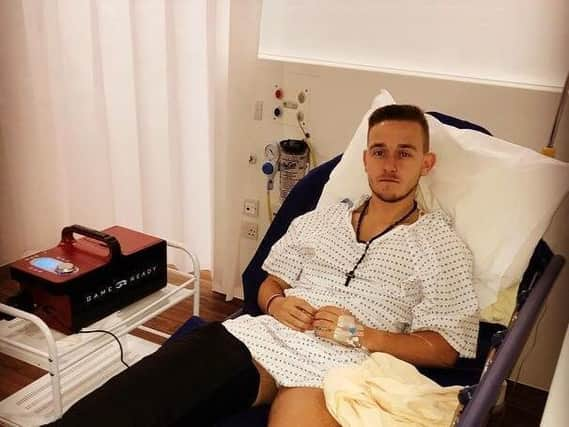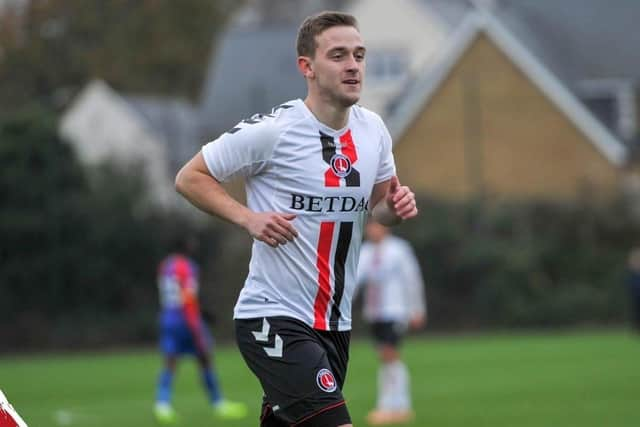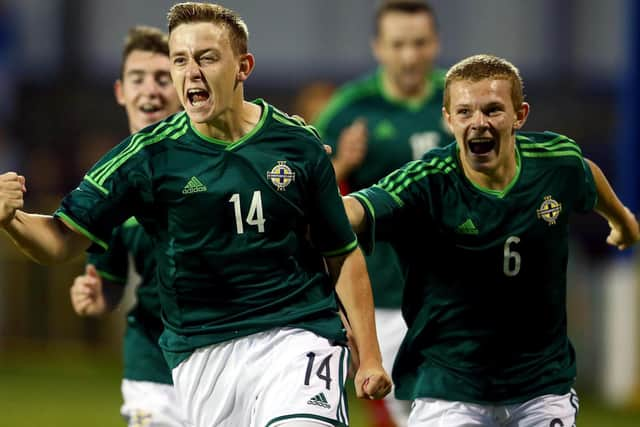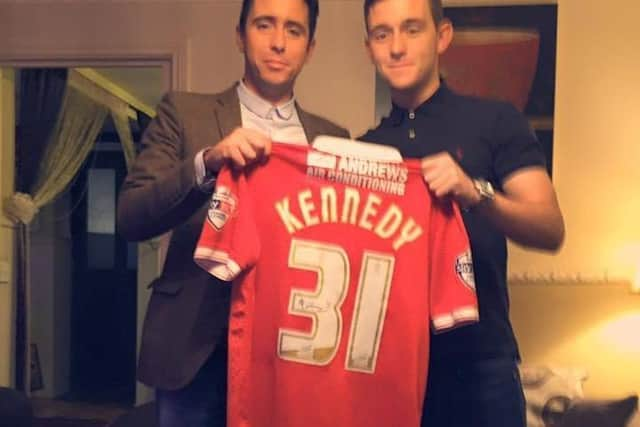Ex Charlton striker Mikhail Kennedy opens up about mental health battle


Less than a year after making the 'heartbreaking' decision to retire, the 24 year-old Shantallow native is striving to build a career outside of football as a counsellor.
A 'disastrous' training ground incident when an innocuous landing ruptured his ACL, had suddenly stopped his promising career in its tracks just five short years after making his senior professional debut!
Advertisement
Hide AdAdvertisement
Hide AdHis 15 months rehabilitation programme and subsequent struggles on the pitch coincided with the sad loss of his grandmother, Sophie McBride, and his close cousin, Paul McMonagle who tragically died, aged 36.
The former Foyle Harps youth talks in detail about the pitfalls of moving to England as a youngster and explains how he felt 'invisible', 'lonely' and reluctant to show any weakness to his teammates or coaches as he bottled up his problems.
Mikhail talks candidly about his struggles with mental health, loneliness and homesickness while at Charlton F.C. and believes it's his 'calling' to become an advocate for young footballers who are suffering in silence.
He's currently working at Seagate Technology in Derry, a job he balances with his counselling course at the North West Regional College where he's in his second year of studies but he still remembers vividly the decision he believes turned his life around.
Advertisement
Hide AdAdvertisement
Hide AdWhen he was at his lowest ebb on the treatment table at Charlton, he was urged to go visit the London club's psychologist, Sion Thomas, and it turned out to be a decision which he believes saved him. Now, he wants to give something back.


"I didn't know too much about mental health but when I look back now, I wouldn't say I was depressed, but I was definitely really struggling and I didn't deal with it," explains Mikhail, "I remember it was Joe Ranson, the Charlton physio, who came to me and said; 'We've a sports psychologist at the club and I think it would be good if you went and spoke to him'.
"I was like: 'What are you on about? What's a sports psychologist?' He obviously noticed something in me that I hadn't even notice myself because I kept telling myself I was alright. I went to speak with Sion and then met him every Thursday for a year and a half and honestly the best thing I ever did was meet him and another man called Gareth Morgan, the club chaplain.
"I don't think those two will ever know what they did for me in terms of helping me. And it's probably just because they listened to me. It was so powerful. I probably used them as life counsellors without even knowing. Now that I'm studying counselling I can see that.
Advertisement
Hide AdAdvertisement
Hide Ad"That first conversation changed my whole outlook and I was like; 'If I'm struggling I'm going to talk about it.' This was probably going on for years and one conversation ended up being a life-changing experience.


"The problem is, men in general, we tend to bottle stuff up. Everybody talks about their mental health but very few do anything about it. There's a lot more awareness now which I think is absolutely fantastic but it is still associated with weakness, especially at a football club."
Mikhail had been so devoted to his dream of making it as a professional footballer from an early age that he never thought about life after football.
A short loan move back at his hometown club, Derry City, back in 2017 failed to reignite his career and after spells with Chelmsford and then Concord in the English National League, the striker was released by Charlton in May 2019, ending an eight year association with The Addicks.
Advertisement
Hide AdAdvertisement
Hide AdFollowing medical advice Mikhail announced his retirement last May at the age of 23. With no GSCEs and very little education, the harsh reality hit home for the former St. Columb's College student as he was forced to write up his first ever CV and look for full-time employment.


"You never think you're ever going to stop playing football. I was always blessed in my early career and never really had many injuries. You hear ex-pros talking about how it's a short career and you don't believe them when you're 21 and have 15 or 16 years. All it takes is one bad tackle or, in my case, one bad landing and it's taken away from you.
"How are you prepared for that? You can't prepare for it. You should! Looking back now I left school before my GCESs and it's one of my biggest regrets.
"At the time I didn't care about it but now that I'm out of football and applying for jobs and it's a minimum of five GSCEs or something like that and I don't even have that. I've no 'A' levels, no education.
Advertisement
Hide AdAdvertisement
Hide Ad"Employers are probably looking at that and thinking 'This boy hasn't a clue. He has no education behind him and obviously isn't very intelligent.'
"I had to write a CV recently and never had to do one before in my life. I wasn't sure what to put on it. Should I put my football awards on it? It's probably the shortest CV in the world," he smiles, "That type of pressure is awful and you never think it's going to happen to you.
"The reality is, this last year has been probably tougher than when I went through my injury. I've got to the stage now that I realise I'm not a footballer anymore whereas for my whole life I had been. It was the only thing I ever did and everybody knows me as a footballer. I've had to go through a process of letting go which has been really tough.
"I realised I needed to talk about it and it's amazing what two people can achieve together just by talking to each other. It's powerful."
Advertisement
Hide AdAdvertisement
Hide AdThe realisation that his football dream was over coincided with the passing of his grandmother and cousin, Paul, whom he described as 'a big brother' but following Paul's funeral Mikhail was straight back on the plane to London and alone again. He believes he never got the chance to grieve properly and those feelings crept up on him all at once.
"I lost my granny and Paul within the space of a year. Paul had moved to London about a year after I was there. He was basically my big brother and he passed away when he was just 36. It was just awful. I wasn't even there. I remember going into my manager and told him my cousin was about to die. It was heartbreaking not being able to say goodbye.
"After his funeral I had no time to grieve. I was on the plane again the next day and back playing football. It was hard as I was living on my own at the time and had no one to talk to.
"What I've learned is you have underlying stuff you try to put to the back of your mind and try to forget about but then something would trigger it. And for me it was the injury. Moving to London at 16, you think you know everything at that age but I was just a kid.
Advertisement
Hide AdAdvertisement
Hide Ad"Coming from Derry it was a million miles different from London. Going over there I struggled badly with homesickness and loneliness. It was a whole different world to me. I don't think I was ever on a train before I went to London and then I was getting on one every day to get to training. The loneliness and homesickness, for me, was really, really challenging. For the first two years I struggled."
When his career ended so abruptly Mikhail believes he was forced to go through his own grieving process and suffered an identity crisis.
"From three or four years of age this was the one thing I was going to sacrifice everything for and I did. It really hit home with me before Christmas when a certain situation triggered me. I spoke to a counsellor and found out I didn't deal with the fact I was no longer a footballer. I found out I was actually grieving myself. Grieving a loss of my identity. Apparently grief can take up to three years to fully manifest itself.
"I always struggled saying 'I'm not a footballer' and once the situation hit home, it was a crazy feeling. It went on for weeks. I had no identity. I didn't know who I was or what I was supposed to be. I achieved a lot in a few years but football doesn't define me as a person."
Advertisement
Hide AdAdvertisement
Hide AdThrough his role as a counsellor Mikhail believes he can help others in similar situations and he's on a mission to break the stigma surrounding mental health. He's volunteering at Northlands Addiction Treatment Centre in Derry, a role he believes he can thrive in.
"I hope people can relate to my story. At the end of the day I'm just a wee boy from 'Shanty' looking to break the stigma of mental illness. I didn't know much about counselling to be honest. I always thought there was a stigma attached to it and was for people who were really struggling and suicidal.
"I didn't think it was for someone like me who was a professional footballer. What would I need counselling for, I was living the dream? It's tough when people were saying; 'You're living the dream' but I was like; 'If this is a dream, wake me up quick.'
"I was out injured for 15 months at Charlton and going to Sparrow's Lane every single day. It got to the point where it seemed there was no end to what was going on. There was no finish line with regards to getting back playing.
Advertisement
Hide AdAdvertisement
Hide Ad"The only thing which would make it better was to play football and it was the one thing I couldn't do. You're doing gym sessions and lying on the physio table and everyone is playing. You become invisible at a football club. You're not important to the football club if you're injured.
"I wasn't comfortable at all seeking help. I never wanted to, I just kept telling myself I was okay. But I was living on my own as well and just had no one to talk to.
"I remember on days off I would realise; 'I've not spoken to anyone today'. You need that human interaction.
Everything just builds up and you just end up exploding and it can lead to breakdowns. I'm not saying I had one but I was definitely very close to one. Very, very close.
Advertisement
Hide AdAdvertisement
Hide Ad"Looking back now, the injury was probably a blessing, which sounds crazy, but it really allowed me to sort my head out. Obviously I still wish I was playing football sometimes but other times I just think 'Naw, it's not you anymore, let it go'.
"The more you push your problems down and ignore them like I did, the worse they get and they will come out at some point whether that's during your football career or off the pitch. I find counselling very powerful. To get an hour of someone's complete undivided attention is powerful. There's just so many distractions nowadays."
Mikhail's faith also played a significant role in his growth as a person. "When I came back from England I went to see the Franciscan monks randomly one Tuesday night and just listening to these men, seeing how happy and content they are to live with absolutely nothing. I now meet them regularly and would go as far as saying they saved me."
Mikhail is hoping his story can inspire others to speak out about their problems and for any young Derry man or woman struggling away from home at university, or for any young footballer dealing with similar pressures, he hopes they get in touch for advice or a listening ear.
Advertisement
Hide AdAdvertisement
Hide Ad"I want to keep studying and promote speaking out for young men and everybody in general, to tell them that it's okay to talk. I lived the dream as they say but my head was up my backside at times. It's okay to talk. It's not a weakness, it's actually a strength and you get so much strength from it.
"If one person hears my story and it inspires them to talk to someone to get help then I see that as a success. It's an amazing sign of strength and it's amazing to be aware of yourself. It's an easy thing, one conversation but it's challenging looking into the deepest darkest parts of yourself to ask what's going on. It's a tough process but so worthwhile."
If you're experiencing a difficult time and need to talk to someone contact: Samaritans on 0330 094 5717; Northlands Centre 028 71313232; Mens Action Network 028 71377777.
You can listen to Mikhail's full story in the Mental Well-balling podcast here
Comment Guidelines
National World encourages reader discussion on our stories. User feedback, insights and back-and-forth exchanges add a rich layer of context to reporting. Please review our Community Guidelines before commenting.